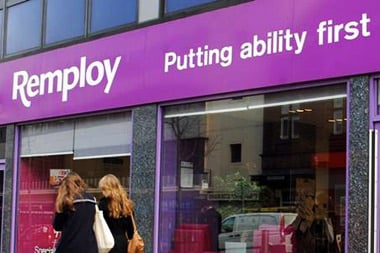Three quarters of ex-Remploy staff are unemployed

One year on from redundancies in wake of factory closures, just 25% of people who benefitted from scheme for disabled workers are currently in work, research shows
Jermaine Haughton
Most of the disabled workers made redundant after last year’s closure of Remploy factories are still unemployed, according to a new report from the GMB union. Set up in the 1940 in Wigan, the state-supported Remploy scheme provided sustainable factory jobs to disabled workers – particularly those who were injured during war or mining. However, a combination of financial losses at the factories, a struggling economy and concerns over the potentially antiquated nature of a specialist employment silo for the disabled led the government to order site closures in 2012.
In an ideal world, improvements in standards, technology and working practices would allow disabled workers to move seamlessly into mainstream jobs. However, just 25% of the 2,000-plus Remploy staff who were laid off have found new work, GMB said – and even so, are grappling with shorter hours and lower pay.
GMB national officer Jerry Nelson says the closure of the factories has had a demoralising effect on the redundant workers and their families. “It is now one year since the final day of the Remploy factory closures,” he said. “Over 2,700 disabled workers had their lives destroyed by this government’s callous and thoughtless attack on the disabled workers, who relied on their employment to maintain their sense of independence, working in an environment of protected equality. The factories were a sheltered environment, and for many of these workers it was their only connection with life outside of their own homes.”
The government argues that it is putting 150 people into work or training each day in its efforts to boost employment, while providing 300 more specialist disability employment advisors (DEAs) at local JobCentres. A Department for Work and Pensions (DWP) spokesman said: “Disabled people deserve the same employment choices as everyone else – rather than being consigned to work in segregated and loss-making factories. A comprehensive 18-month support package, worth £8m, was provided for those made redundant. Since last year, over 80% of ex-Remploy workers have [either] found jobs, or are receiving specialist employment support and training to help them find one.”
Ex-Remploy staffers’ plight has highlighted the broader issue of making the jobs market fairer for disabled workers. Yesterday, BBC News claimed to have evidence to suggest that proposed changes to the government’s Access to Work scheme is set to deny many disabled people the chance to work. Established two decades ago, the scheme supports disabled people with daily assistance, such as wheelchair ramps or interpreters for the deaf.
However, the BBC report hinted at a cynical change in government policy, aimed at catching out bogus claimants, coupled with a £6m reduction in spending over the past three years – both of which threaten to damage many disabled workers’ career prospects.
Looking north, Fergus Ewing MSP has called on the UK government to reassure workers and bosses alike by maintaining support for the DWP’s Work Choice funding. With more than 50% of their workforce consisting of disabled employees, businesses in Scotland receive £2.9m of income annually through the DWP scheme. However, funding for the programme is soon to be reviewed.
Ewing said: “Scotland’s supported businesses play an important role in helping disabled people find sustained and fulfilling work opportunities, and often act as a stepping stone towards mainstream employment. The uncertainty regarding DWP's Work Choice funding is an ongoing challenge, and I have written to DWP urging them to discuss the future of financial support given to supported businesses through Work Choice.”
Read further recent Insights coverage of issues around disability in the workplace.
Image of Remploy branch courtesy of LabourList.

Press & Media Enquiries
For more information or to request interviews, contact CMI's Press Team on 020 7421 2705 or email press.office@managers.org.uk


